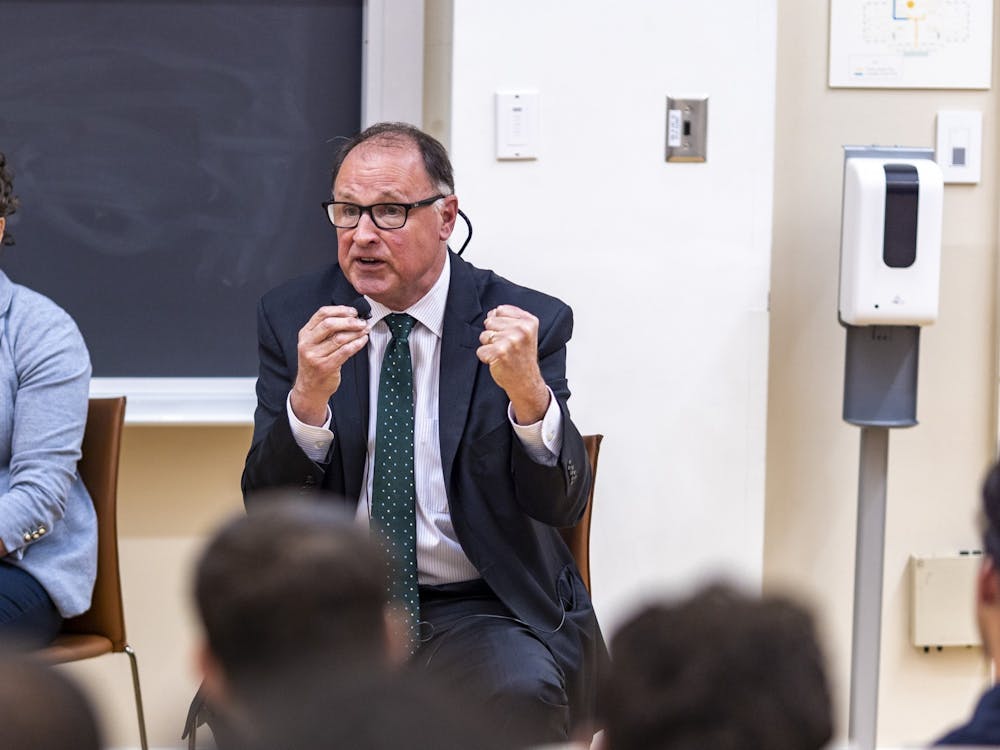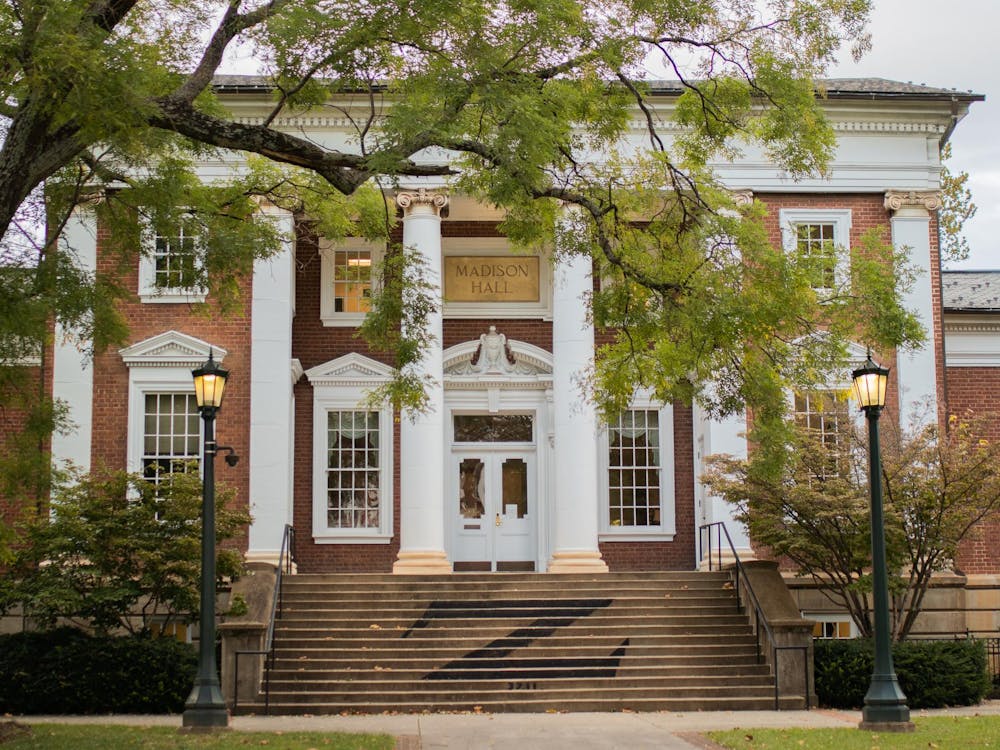Virginians will vote today in a historic election that will decide if the Republican Party gains both houses of the General Assembly for the first time in Commonwealth history, giving them the potential to alter the balance of Virginia politics for the coming decade.
The election threatens to sweep away the Democrats' tenuous hold in the House of Delegates, giving Republicans control of the General Assembly for the first time since Reconstruction, when after the Civil War, Virginia was a military district.
"The stakes are huge," said Mark Rozell, Catholic University professor of politics. "This is truly a historic election."
Not only would capturing the legislature smooth the way for conservative initiatives by Virginia Gov. James S. Gilmore III (R), such as the car tax cut, but Republicans would also call the shots in the 2001 redistricting.
By redrawing district lines to dilute the other party's voter base, the majority party can take seats away from the opposition, a process Democrats have used to strengthen their hold on the legislature in the past. Such gerrymandering could help solidify Republican gains in the legislature.
"It's a historic opportunity for Republicans," said Robert Holsworth, director of the Center for Public Policy at Virginia Commonwealth University.
"The General Assembly will help redraw the political map for the next century," Holsworth said.
Republicans enjoy a 21-19 majority in the Senate and, with the help of an Independent, split the 100-seat House with the Democrats. The two parties' power-sharing agreement in the House will give way to majority control if either party can pick up a seat.
The chances
Analysts say the political layout favors a Republican gain in the House.
Half of the seats in the General Assembly are uncontested, and of the contested seats, incumbents are running for re-election in most of them.
Incumbents are generally hard to beat, especially in the current good economic times. That limits the number of races considered competitive.
"It's a handful in both the House and the Senate" that are close races, said Stephan Medvic, assistant professor of Political Science at Old Dominion University.
The biggest opportunity for picking up seats lies in open seats - districts where incumbents are retiring. Only five of these seats are open, and Democrats are leaving four of them, making it more likely that the Democrats will lose seats.
"The odds favor the Republicans," said Larry J. Sabato, government and foreign affairs professor. The Democrats would have to win every close race not to lose control of the House, he said.
Although gaining three or four House seats would give Republicans strong control of the General Assembly - and more political muscle to push through their initiatives - they only need one more House seat to run redistricting in 2001.
"Ideally, they would get 53 to 54 seats, but it only takes 51 to pass a redistricting program," Sabato said.
Every 10 years, the state legislature redraws federal, state and local districts.
Redrawing district lines, especially in the smaller House districts, can give one party an advantage over the other in future elections.
For much of Virginia's history, the Democratic Party ruled Virginia politics. But beginning in 1969, many of the state's conservative Democrats started switching to the Republican Party, beginning the two-party era in Virginia, Sabato said.
The Republican Party has continued to gain seats in the legislature over the past three decades, culminating in their chance to become a majority at the end of the century.
But despite the statewide importance of the election, voter turnout will likely be low because the elections are local.
"This is the traditional low point" in the election cycle, Sabato said.
And despite the political implications, most voters are expected to choose candidates based on personal impressions rather than political considerations.
"The reality is, each race is an individual campaign," Rozell said.
Record infusion of dollars
The election's importance has incited record spending on the races, fueled by large contributions by individuals and groups, Rozell said. The flush economy and the state's lax fundraising regulations also benefit money-raising efforts, analysts said.
Analysts also noted that Republicans have the financial edge over Democrats.
The political parties and state leaders are responsible for much of the fundraising, doling out the proceeds to candidates in close races.
Republicans have collected much of this money, enjoying a lead over Democrats of over $9.5 million against their $7 million.
The Democrats' fundraising disadvantage comes partly from their lack of popular party leaders, analysts said.
Gilmore has been active raising money for Republican candidates, along with U.S. Rep. Tom Davis, (R-llth), Lt. Gov. John Hager (R), and Attorney General Mark Early (R).
The only statewide fundraisers for the Democrats have been Mark Warner, an aspiring party leader and potential candidate for governor in 2001, and Sen. Charles Robb (D). But Robb is restricted partly by his own fundraising needs for the upcoming Senate race against former Virginia Gov. George Allen (R).
"Robb is going to need money for his own campaign," said Scott Keeter, professor and chairman of the Department of Public and International Affairs at George Mason University.
Despite the money disparity, Democrats say they have spent their money wisely.
"We have targeted our resources more effectively, so we are able to compete in the races that really matter," Virginia Democrats Executive Director Craig Bieber said.
The hot races
Most seats will be won or lost in a few close races.
In Fairfax County, incumbent Sen. Jane H. Woods (R) faces a tight race in a democratic district with former congresswomen Leslie L. Byrne of Falls Church, with independent Virginia T. Dobey of Fairfax threatening to sap critical votes from Woods.
"Jane Woods' is the most democratic district in either house held by a Republican," Matricardi said.
Democrats are hopeful of taking her seat.
"We think we have a good shot at that one," Bieber said.
The House 84th district between Del. Robert F. McDonnell (R) and former sheriff Frank Drew (D) is also close, Medvic said. Another Virginia Beach/Norfolk Senate seat may see an upset as Republican D. Nick Rerras labors to defeat Del. Stanley C. Walker (D-Norfolk), he said.
In Southwest Virginia, Sen. John Edwards, (D-Roanoke), may lose to William H. Fralin Jr. (R) after serving one term. In total, analysts believe about 12 districts hold close races.
"Eleven out of 140 are considered true toss-ups," Sabato said. "A pitifully small number."
But although the election looks favorable for the Republicans, Democrats' chances are still viable for holding on to the House or gaining in the Senate.
"Predictions are always silly," Sabato said.
Key Races
SENATE
-Jane H. Woods (R-Fairfax) vs. Leslie L. Byrne (D)
-Frederick M. Quayle (R-Chesapeake) vs. Elizabeth Morse Psimas (D)
-John S. Edwards (D-Roanoke) vs. William H. Fralin Jr (R)
-Stanley C. Walker (D-Norfolk) vs. D. Nick Rerras (R)
-Richard J. Holland (D-Isle of Wight County) vs. T.C. "Tommy" Wright (R)
HOUSE
District 7, Radford and Pulaski counties and part of Giles County
-Barbara M. Chrisley (R) vs. W.B. "Benny" Keister (D)
District 44, part of Fairfax county
-Kristen J. Amundson (D) vs. Scott T. Klein (R)
-George E. Bron man Jr. (R-Culpeper)
District 67, part of Fairfax county
-Roger J. McClure (R-67) vs. James E. Mitchell (D)
District84, part of Virginia Beach
-Robert F. McDonnell (R-84) vs. Frank Drew (D)
District 86, part of Norfolk
-Donald L. Williams (D-84) vs. Beverly B. Graeber (R)
District 91, parts of Hampton and Poquoson
-P.E. "Phil" Larrabee Jr. (R) vs. James R. "Jay" Joseph (D) (main challenge) also contending: Ross A. Kearney (I), R.T. "Rudy" Langford (I)
District 43, part of Fairfax County
-Gladys B. Keating (D-43) vs. Thomas M. "Tom" Bolvin






